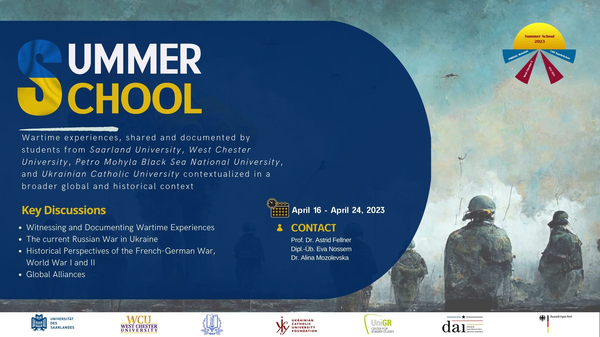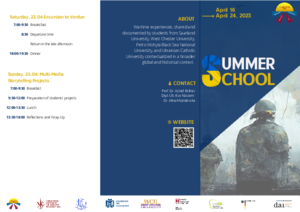NEW TAD ACTIVITY:
Summer School 2023: Wartime Experiences
From April 16 to April 24, 2023 Saarland University will be hosting students and faculty members from West Chester University (WSU) in the United States, Petro Mohyla Black Sea National University and Ukrainian Catholic University (UCU) in Ukraine for an International Summer School where students will engage with the idea of “Witnessing and Documenting Wartime Experiences.”
Description
Borders—especially border transgressions—and wars are closely connected: wars are being foughtover territorial issues, and borders are often subject to conflicts. Borders are being weaponized, andthey are often viewed in terms of military preparedness and confrontation. They are therefore central to our understanding of societies that are affected by war experiences.This international summer school focuses on wartime experiences, shared and documented by young people and contextualized in a broader global and historical context. It will address issues of border crossings and migration, living conditions and the many challenges that life brings about in times of war.The main aims pursued in this summer school are to give voice to testimonials, to empower those who share their stories, to bolster the exchange, and to build strong alliances between youth from Ukraine, Germany/Europe, and the U.S. Students from Saarland University (Germany), and West Chester University (USA)will meet up with students from Ukraine (Lviv and Mykolaiv) for an entireweek in order to analyze and talk about first-hand experiences, integrating them into a scientific Border Studies debate, contextualizing them both historically and globally in the long history of border disputes andwars over borders.
Contact:
Prof. Dr. Astrid M. Fellner (fellner@mx.uni-saarland.de)
Dipl.-Üb.in Eva Nossem (e.nossem@mx.uni-saarland.de)
Dr. Alina Mozolevska (alina.shkurat@gmail.com)
Aims and Objectives of this International Summer School
We want to bring students of the Greater Region (SaarLorLux+) together with students from Mykolaiv and Lviv, Ukraine and West Chester U in Pennsylvania, USA and have them engage in a serious dialogue about lives during wartimes in borderlands. In doing comparative and practical work in Border Studies and digital history, we hope that you will learn from each other. We also hope that you will be able to critically reflect upon border disputes and issues and that you will be motivated to engage in a critical intervention in an identity construction process that involves cross-border or other identity conflicts and power differentials. We hope that you can take with you from this course some deeper understanding of wartime experiences and that the knowledge acquired in this course will enable you to intervene critically in a real-life situation.
The overall intercultural aims of our collaboration are:
- to increase students’ mutual understanding between cultures and nations
- to raise students’ awareness of the significance of history
- to enable students to function as mediators between cultures
- to foster a transcultural dialogue and interaction in a critical yet respectful way that is framed by students’ awareness of their own positionality and corollary interest as cultural subjects.
Structure of the Summer School:
The summer school is structured in three phases: In the first phase of this collaborative class “Identifying Locations,” students share readings on Cultural Studies research. The second phase of this class “History of War and Trauma and Representations in the Arts” will also focus on shared readings and will include master classes. Based on the preparatory theoretical work and the practical investigations during the first couple of days of the summer school, students will then investigate selected topics in more detail in the third phase entitled “(Digital) Storytelling.” The summer school will also include excursions: students will visit battlefields in the Saarland as well as in France.
Pre- and post-summer school work:
This collaborative, international project will consist of a summer school in April 2023, which will take place in Saarbrücken, Germany. It will be followed by independent collaborative work via zoom in the following months. Students will conduct interviews and craft a digital storytelling project, which will then be published in the fall of 2023.
Since students share the same course readings and tasks during the summer school, they have to prepare for this summer school before we meet in April. Students can also get into contact prior to their meeting in April via e-mail and/or the tool wonder.me. After a general introduction to the main themes of the course and a series of classes taught by international experts in the fields of Border Studies, Cultural Studies, Literary Studies, history, digital storytelling, and ethnography, you will work independently in small teams. You will do independent research on your topics and you will work together with our core faculty, who will help you produce your multi-media products. You will then present your results to the entire group at a later point in the fall of 2023.
Schedule
Here you can find the complete programm description and schedule for the 2023 Summer School. Please note that this schedule may be subject to change.
Team
Organizing Team
Co-ordinator at Saarland University(UdS): Prof. Astrid M. Fellner
Co-ordinator at Ukrainian Catholic University (UCU): Prof. Oleksandr Pronkevich
Co-ordinator at West Chester University(WCU): Prof. Robert Kodosky
Project Management: Alina Mozolevska, Eva Nossem
Student helpers: Maleeka Zainab, Viktoriia Karakatsi
Faculty Members:
Prof. Janneken Smucker (West Chester), Dr. Olha Polishchuk (PMBNU/UdS), Anastasiia Mikhieieva(PMBNU), Dr. Viktoria Sereda (UCU/FU Berlin), Prof. Tetiana Shestopalova (PMBNU/UdS), Valeriia Biloshapko (PMBNU/UdS), Dr. Svitlana Kot (PMBNU/UdS), Dr. Cheri Carter (Temple University).
Funding & Support
Organized, hosted, and funded by NamLitCult
Funded by the UdS Internationalization Fund
with generous support by the German-American Institute Saarland (DAI Saarland)




